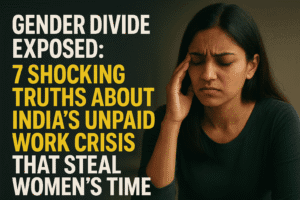Gender Divide Exposed: 7 Shocking Truths About India’s Unpaid Work Crisis That Steal Women’s Time
India’s 2024 Time Use Survey reveals a stark gender divide where men’s participation in domestic and care work is largely confined to outdoor tasks (shopping, errands) and playing with children. Women bear the overwhelming physical and invisible mental burden of household management, routine chores, and intensive caregiving – spending 150% more time on unpaid work. This hidden cognitive labor – planning, organizing, and passive supervision – severely limits women’s time for paid employment, rest, or self-care.
Shockingly, social norms enforce this imbalance, with Oxfam data linking domestic failure to violence against women in some states. While wealth increases chore-sharing slightly, it reduces direct caregiving, and employed women face a crushing “double shift.” Regional variations (higher male participation in Kerala/Northeast vs. Gujarat/Maharashtra) offer clues for change. Addressing this requires policy (childcare, parental leave), cultural shifts valuing men’s role in all care work, and recognizing women’s unpaid contributions (3.1% of GDP) – demanding concerted societal action for true equity.

The Visible vs. The Invisible: Where Men’s Participation Stops
The data paints a clear picture of compartmentalization:
- The “Outdoor” Domain: Men’s primary contributions cluster around tasks outside the home’s core: shopping for the household (43.7% participation), travelling/transporting for family needs (32.1%), and maintaining vehicles/property (46.2%). These are often episodic, less time-bound activities.
- The Play Gap: When it comes to caregiving, men are most present in “physical care of children” (18.3%) and crucially, playing with children (a significant 22.1%). This reflects bonding but avoids the logistical and supervisory load.
- The Missing Mental Load: Where participation plunges is in the realm of constant cognition and management. Activities like organising, budgeting, and household administration (“Household management for own final use”) see minimal male engagement (under 10%). Even in childcare, men are largely absent from the “mental labour” – arranging school meetings, managing schedules, or the exhausting task of “minding children” (passive supervision). Women overwhelmingly handle these, alongside the bulk of cooking, cleaning (73.2% participation), and minding dependents.
The Crushing Weight of the “Double Shift”
The consequence isn’t just inequality; it’s a systemic constraint:
- 150% More Burden: Women spend, on average, two and a half times more hours on unpaid domestic and care work than men. This isn’t leisure time; it’s stolen from potential paid employment, education, rest, or self-care.
- The GDP’s Hidden Engine (and Cost): This unpaid labor is estimated to contribute 3.1% to India’s GDP – a massive, unrecognized subsidy to the formal economy. Yet, the women providing it pay the personal cost in lost opportunities and chronic time poverty.
- The Mental Labour Tax: Beyond physical chores, women bear the constant cognitive burden – remembering schedules, anticipating needs, managing emotions, solving daily crises. This invisible “managerial” role is exhausting and rarely shared.
- Violence as Enforcement: Shockingly, Oxfam data reveals the dangerous underbelly of these entrenched norms: significant percentages of men in several states found physical violence acceptable if women failed domestic tasks like fetching water, cooking, or childcare. This underscores how deeply these roles are policed.
Puzzling Patterns: Wealth, Work, and Region
The survey reveals nuances challenging simple assumptions:
- The Wealth Paradox: As family consumption rises, participation in domestic chores increases slightly for both genders (perhaps due to larger homes/more assets?). However, participation in core caregiving (especially for children and the sick) decreases, likely outsourced to paid help. Notably, wealthy urban men show a surprising bump in cooking participation.
- The Employed vs. Time Paradox: Employed individuals (both men and women) show slightly higher participation rates in unpaid work. However, they spend less average time on it, likely due to severe time constraints. Employed women still spend far more time on unpaid work than employed men, while also spending less time on paid work than their male counterparts – the essence of the “double burden.”
- Regional Variations Offer Glimmers: States like Kerala and several in the Northeast show higher-than-average male participation in domestic work, suggesting cultural or policy influences (e.g., Kerala’s history of social reform). Conversely, states like Gujarat, Maharashtra, and West Bengal lag significantly. This demands deeper investigation into local drivers.
Beyond Charts: The Human Cost and the Path Forward
The data isn’t just numbers; it reflects millions of women’s daily realities:
- Stifled Potential: The time drain directly limits women’s participation in the paid economy, career advancement, and personal development.
- The Exhaustion Gap: The constant mental and physical load contributes to chronic stress and health issues among women.
- Perpetuating Cycles: Children observing these imbalanced roles internalize them, perpetuating the cycle into the next generation.
Breaking the cycle requires systemic shifts, not just individual goodwill:
- Challenge the “Mental Load” Invisibility: Recognize and name the cognitive labour. Actively share responsibility for planning, scheduling, anticipating needs, and emotional management – not just discrete tasks.
- Policy Levers: Invest in affordable, quality childcare and eldercare infrastructure. Implement and encourage equitable parental leave policies. Promote flexible work arrangements for all genders.
- Cultural Reckoning: Media, education, and community leaders must actively challenge stereotypes that equate caregiving solely with women and “outdoor” tasks as the limit of male domestic contribution. Highlight positive examples of shared household management.
- Redefine “Participation”: Move beyond just “playing with kids” or occasional chores. Encourage and value male engagement in the routine, mundane, and managerial aspects of daily home life – the doctor’s appointments, the meal planning, the noticing when supplies run low.
India’s gender divide in unpaid work isn’t just about who washes the dishes. It’s about who carries the invisible weight of keeping a household and family functioning. Until the mental load and the bulk of routine, time-sucking caregiving are equitably shared, true equality – and the unlocking of women’s full potential – will remain out of reach. The Time Use Survey data is a stark wake-up call; the response must be concerted action on every front.
You must be logged in to post a comment.